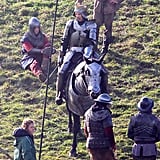

No less apt was the repeated sight of Richard's fingers tapping nervously, the agitation an aural prefigurement of that famous horse without which Richard has no kingdom and no life. Along the way, its visual command confirmed director Dominic Cooke as a screen natural, should this gifted theatre director (his National revival of Ma Rainey's Black Bottom remains the London stage highlight of the year so far) choose to segue to the cinema, as many of this series' other directors have already done.įrom its title character's opening soliloquy through to a climactic image suggesting the charnel house of history, Cooke carved a compelling visual path through adaptor Ben Power's deftly filleted version of a particularly single-minded play that here used a chessboard as a cunning visual motif. By the end of the first film, with much blood already spilled, the spectre of hellishness to come looms in the crooked silhouette of the Duke of York’s third son, summoned into the story.Those who associate Shakespeare's "bottled spider" with various excuses through the years for overindulgence and/or camp got instead a portrait of gathering psychosis that was considerably more biting and bitter than has generally been true of this play of late. We rejoin the story with Henry VI (Tom Sturridge) now the nominal monarch but all power vested in his uncle, Henry V’s brother Humphrey, Duke of Gloucester (Hugh Bonneville). The grand narrative arc of more than a century of dynastic conflict between Yorkists and Lancastrians is brought compellingly into focus by Ben Power’s streamlined adaptation. The result, as spied from a press screening this week before the films’ broadcast in early May, is moreishly thrilling – and features a dazzling turn from one of the most talked about actors of our age.

The latest instalment of The Hollow Crown – following on from the four plays, culminating in Henry V, which the BBC adapted in 2012 - has tidied the Henry VI plays into two two-hour films.

In the theatre their contorted politics – featuring many characters named after counties and cathedrals – can have the feel of a marathon run in a maze. The Henry VI trilogy comprises the least loved of Shakespeare’s histories.


 0 kommentar(er)
0 kommentar(er)
